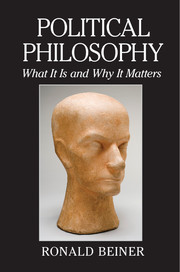Book contents
- Frontmatter
- Dedication
- Contents
- First Prologue: Horizons of Political Reflection
- Second Prologue: Freud, Weber, and Political Philosophy
- 1 Hannah Arendt: The Performativity of Politics
- 2 Michael Oakeshott: Life’s Adventure
- 3 Leo Strauss: The Politics of Philosophy
- 4 Karl Löwith: In Awe of the Cosmos
- 5 Excursus on Nature and History in the Strauss-Löwith Correspondence
- 6 Eric Voegelin: Modernity’s Vortex
- 7 Simone Weil: The Politics of the Soul
- 8 Hans-Georg Gadamer: Philosophy without Hubris
- 9 Jürgen Habermas: Politics as Rational Discourse
- 10 Michel Foucault’s Carceral Society
- 11 Alasdair MacIntyre: Fragmentation and Wholeness
- 12 Short Excursus on the Rise and Decline of Communitarianism as a Political Philosophy
- 13 John Rawls and the Death of Political Philosophy
- 14 Richard Rorty: Knocking Philosophy off Its Pedestal, or the Death of Political Philosophy Postmodernized
- Epilogue: On Not Throwing in the Towel
- Index
- References
9 - Jürgen Habermas: Politics as Rational Discourse
Published online by Cambridge University Press: 05 August 2014
- Frontmatter
- Dedication
- Contents
- First Prologue: Horizons of Political Reflection
- Second Prologue: Freud, Weber, and Political Philosophy
- 1 Hannah Arendt: The Performativity of Politics
- 2 Michael Oakeshott: Life’s Adventure
- 3 Leo Strauss: The Politics of Philosophy
- 4 Karl Löwith: In Awe of the Cosmos
- 5 Excursus on Nature and History in the Strauss-Löwith Correspondence
- 6 Eric Voegelin: Modernity’s Vortex
- 7 Simone Weil: The Politics of the Soul
- 8 Hans-Georg Gadamer: Philosophy without Hubris
- 9 Jürgen Habermas: Politics as Rational Discourse
- 10 Michel Foucault’s Carceral Society
- 11 Alasdair MacIntyre: Fragmentation and Wholeness
- 12 Short Excursus on the Rise and Decline of Communitarianism as a Political Philosophy
- 13 John Rawls and the Death of Political Philosophy
- 14 Richard Rorty: Knocking Philosophy off Its Pedestal, or the Death of Political Philosophy Postmodernized
- Epilogue: On Not Throwing in the Towel
- Index
- References
Summary
Jürgen Habermas has had a long and fruitful intellectual career. One can distinguish different phases of his life’s work, though running through all of these stages in the unfolding of his political philosophy are the twin themes of the public sphere and communicative rationality. He first came on the scene in 1962 with an interesting book on the history and sociology of the notions of publicity, public opinion, and the bourgeois public sphere, as these took shape in eighteenth-century European societies. In 1968, he published an important work trying to establish the possibility of a form of knowledge constituted by a universal human interest in emancipation. Habermas here takes psychoanalysis as his model of a type of knowledge serving an emancipatory human interest, where the analyst helps the patient throw off neuroses that inhibit or block his or her potentialities as a human being. However, Gadamer argues effectively against Habermas, in a famous debate between the two of them, that it would be more than a little worrisome for the society as a whole to put itself in the hands of “therapists,” as the patient seeking help in being liberated from the grip of neuroses does, thus privileging the therapist’s supposedly superior understanding over the self-understanding of the rest of us.
Habermas then devoted a big chunk of his career to trying to draw a political philosophy out of the philosophy of language with his conception of an ideal speech situation as the standard by which we measure whether our practice of politics is what it should be. This is a conception that Habermas developed in a highly technical idiom, notwithstanding the simplicity of the basic idea. What is that basic idea? It is that no one would enter into a political debate (an exchange of presumed-to-be-valid reasons) unless they were already committed to the outcome reposing on the rational vindication of one set of reasons over its competitors, rather than non-rational considerations of whatever kind. It is supposed to follow from this that the normative ideal in play here is not simply conjured up by the theorist but is immanent in political life itself.
- Type
- Chapter
- Information
- Political PhilosophyWhat It Is and Why It Matters, pp. 135 - 150Publisher: Cambridge University PressPrint publication year: 2014



